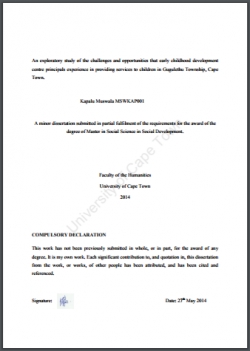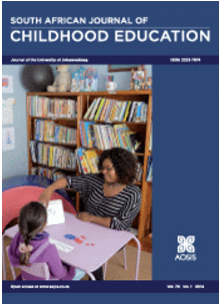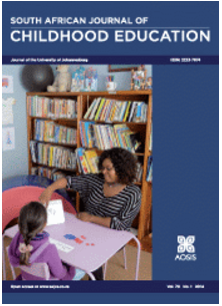Learners with intrinsic barriers to learning experiences of the support provided to them in a mainstream school

Type
Thesis
Authors
Category
ECCE, Foundation, Intermediate
[ Browse Items ]
Publication Year
2016
Publisher
North West University, Potchefstroom, South Africa
URL
[ private ]
Pages
188 p.
Subject
Early childhood education, Primary education, Foundation Phase, Intermediate Phase, Inclusive education, Teachers, Educators, Inclusion, Barriers to learning, Mainstream, Support, South Africa
Tags
Abstract
Effective learning is related to the emotional and social well-being of each learner (Pieterse, 2010:174). The way learners experience their school environment influences their learning and their well-being. The focus of this study was the experiences of learners with intrinsic barriers to learning of the support provided in a mainstream school in Centurion, Pretoria. Viewed in terms of a bio-ecological theoretical framework, the experiences of learners with intrinsic barriers to learning with regard to the support they receive are constantly influenced by their interactions with the environment. The aim of this study was to explore and describe the unique experiences of such learners with regard to the support they receive and how these experiences influence their well-being. The research question for this study was as follows: How do learners with intrinsic barriers to learning experience the support provided to them in a mainstream school? A research study of this nature was needed because, although there is an abundance of international literature on the subject, there is a noticeable scarcity of information about learners‘ experiences of the support they receive in the South African context. The experiences of such learners in terms of the support they receive in school influence their overall well-being and can negatively impact their ability to participate in classrooms (Pieterse, 2010:174). The research question was addressed through the use of qualitative descriptive research (Sandelowski, 2010:78) that explored and described the experiences of learners. This research design allowed the researcher to gain rich and holistic data from the learners and the way in which they give meaning to their own experiences. Ten learners with barriers to learning were selected in a mainstream school in Pretoria, Gauteng. All the participants were between the ages of 8 and 13 years of age and were able to speak English or Afrikaans. These learners were selected by means of purposive sampling, thus enabling the researcher to include participants according to the relevant criteria. Ethical approval was obtained from the North-West University. Because learner participation was essential to the research, special attention was given to all ethical aspects regarding young learners throughout the research process. Informed assent was obtained from the learners and informed consent was obtained from their parents or guardians. Parents were made aware that their children‘s participation was voluntary and that they were free to withdraw from the study at any time and for any reason without negative consequences. The aim of the study was explained to them, as was the assurance of confidentiality, what was expected of them, what the data would be used for and who would have access to the data. All records have been kept safe and confidential within the supervisor-supervisee relationship. Collage work and semi-structured interviews were used as methods of data collection in order to gain a detailed picture of learners‘ experiences of the available support. Collages were used as a draw-and-talk technique to facilitate the rich exploration of learners‘ experiences and to support the interview process. These interviews were conducted following an interview schedule compiled in accordance with the literature study. The interviews were transcribed for the purpose of data analysis and were analysed to transform the transcribed data into meaningful information. The theme was divided into sub-themes, discussed according to relevant narratives from the interviews and controlled by means of literature. The findings indicate that learners with intrinsic barriers to learning do experience support at the various levels they operate at and in the relationships they have. Learners were found to be experiencing support in their school environment through context, with specific reference to the meso level. Support experienced can serve as a protective factor while a lack of support can imply risk factors in respect of scholastic success, overall development and well-being. Insight was further gained as to how the factors in each environment can influence other systems with regard to the support these learners receive. Recommendations are made in accordance with the conclusions and findings of this study. The most important recommendation is that protective factors identified to provide learners with the experience of support should be nurtured and maintained. An in-depth study investigating the experiences of learners with barriers to learning regarding the support they receive in other geographical areas is recommended. More comprehensive studies are necessary and should encompass the various provinces of South Africa where resources and support structures may vary significantly. This will provide valuable data concerning how learners with intrinsic barriers to learning experience support elsewhere and will be useful for purposes of comparison and contrasting. This could, in turn, lead to the implementation of improved support structures in mainstream schools for learners with intrinsic barriers to learning.
Number of Copies
1
| Library | Accession No | Call No | Copy No | Edition | Location | Availability |
|---|---|---|---|---|---|---|
| 1 | Potchefstroom, North West Province, South Africa | Yes |


